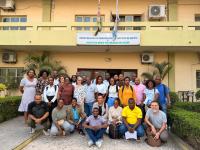Sixty-ninth World Health Assembly
 After a week of extensive debates, the 69th Session of the World Health Assembly ended on May 28, in Geneva (Switzerland). The last day of discussions included topics that had been part of the agenda of the WHO for more than four years, such as the Framework of Engagement with Non-state Actors (FENSA), whose resolution was headed by Argentina.
After a week of extensive debates, the 69th Session of the World Health Assembly ended on May 28, in Geneva (Switzerland). The last day of discussions included topics that had been part of the agenda of the WHO for more than four years, such as the Framework of Engagement with Non-state Actors (FENSA), whose resolution was headed by Argentina.
During the sessions, there were also global strategies approved for HIV, viral hepatitis and sexually transmitted diseases, as well as a resolution on health in the 2030 Agenda, through which the member countries recognized the need for multi-sectoral collaboration. Likewise, Margaret Chan, Director-General of the World Health Organization (WHO), highlighted that “it is not possible to achieve the sustainable development goals without tackling the social, economic and environmental determinants of health”.
Another important item of the agenda approved is related to the inappropriate promotion of food products for children. The session had a major participation of Ecuador, which shared its experience of food labelling policy. Furthermore, in the item on surveillance and response, the countries established the reform of the WHO Emergency Programme, which reinforced the guiding role of the organization. They also reiterated the resolution on the application of the International Health Regulations (IHR), which was legitimated as "the only tool for governance of global health security", according to the Director-General, Margaret Chan.



